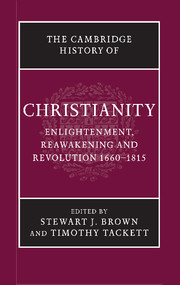Book contents
- Frontmatter
- Introduction
- PART I CHURCH, STATE, AND SOCIETY IN THE EUROPEAN WORLD, 1660–1780
- PART II CHRISTIAN LIFE IN THE EUROPEAN WORLD, 1660–1780
- PART III MOVEMENTS AND CHALLENGES
- 13 Christianity and the rise of science, 1660–1815
- 14 The Enlightenment critique of Christianity
- 15 The Christian Enlightenment
- 16 Jansenism and the international suppression of the Jesuits
- 17 Evangelical awakenings in the North Atlantic world
- 18 Toleration and movements of Christian reunion, 1660–1789
- PART IV CHRISTIAN DEVELOPMENTS IN THE NON-EUROPEAN WORLD
- PART V REVOLUTION AND THE CHRISTIAN WORLD
- Chronology
- Bibliography
- Index
- References
15 - The Christian Enlightenment
from PART III - MOVEMENTS AND CHALLENGES
Published online by Cambridge University Press: 28 March 2008
- Frontmatter
- Introduction
- PART I CHURCH, STATE, AND SOCIETY IN THE EUROPEAN WORLD, 1660–1780
- PART II CHRISTIAN LIFE IN THE EUROPEAN WORLD, 1660–1780
- PART III MOVEMENTS AND CHALLENGES
- 13 Christianity and the rise of science, 1660–1815
- 14 The Enlightenment critique of Christianity
- 15 The Christian Enlightenment
- 16 Jansenism and the international suppression of the Jesuits
- 17 Evangelical awakenings in the North Atlantic world
- 18 Toleration and movements of Christian reunion, 1660–1789
- PART IV CHRISTIAN DEVELOPMENTS IN THE NON-EUROPEAN WORLD
- PART V REVOLUTION AND THE CHRISTIAN WORLD
- Chronology
- Bibliography
- Index
- References
Summary
The term ‘Christian Enlightenment’ no longer raises eyebrows; but this is a relatively recent phenomenon. A widespread consensus used to exist that the very essence of the Enlightenment – what made the Enlightenment ‘enlightened’ – was its attack on religion. According to Paul Hazard’s influential interpretation, the express aim of the Enlightenment was to ‘put Christianity on trial’ and even to annihilate ‘the religious interpretation of life’; similarly, Peter Gay described the Enlightenment as a ‘war on Christianity’. Many scholars before and after agreed with this point of view. They described the Enlightenment as being – by its very nature – anti-Christian, anti-Church and even anti-religious.
We now know, however, that the relationship between Christianity and the Enlightenment was far more complex and interesting. We realize that these previous interpretations were overly focused on France, and erroneously tended to posit a single Enlightenment. Over the past few years, scholars have been ‘pluralizing’ the Enlightenment, the result being that we now see it not so much as a unified and Francophone phenomenon, but rather as a ‘family of discourses’ with many regional and national variations across Europe and in America. It has become clear that earlier interpretations were based on an impoverished view of religious traditions and perhaps even an outright disdain for them.
- Type
- Chapter
- Information
- The Cambridge History of Christianity , pp. 283 - 301Publisher: Cambridge University PressPrint publication year: 2006
References
- 6
- Cited by

